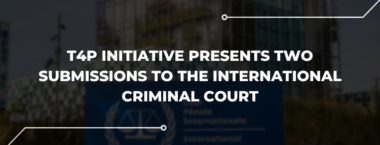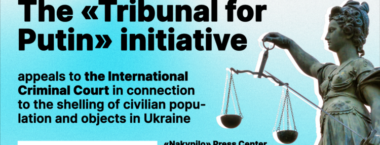
Torments, Torture Chambers, Executions: T4P Initiative Presents Two Submissions to the International Criminal Court
Information about extrajudicial executions of Ukrainians by the Russian military and Russian torture chambers in...
28 September 2023
21.11.2017
On November 20, 2017, the Ombudswoman’s Office once again hosted the event, where the work on an interesting and promising document of like-minded people began. The conceptual and strategic document has a working title “State Policy Principles to Protect Human Rights to Overcome Consequences of the Armed Conflict.” Its purpose is to develop a state philosophy to overcome the problems caused by the armed conflict, and, accordingly, to help developing clear and effective steps of the government shortly.
The society expects the state to help those, who suffered from the conflict. Victims of the conflict also demand to restore their rights and to bring perpetrators of crimes to justice, because of a lack of effective investigation of war crimes.
The working group has several members and includes experts from the Office of the Commissioner for Human Rights, experts from non-governmental organizations, MP I. Lapin with his team, and (remotely) representatives of respective ministries.
Taking the discussion of approaches to Transitional Justice as a basis, at the beginning the working group agreed on the restored nature of the state policy towards inhabitants of the occupied and annexed territories. It included the following activities: recognizing victims of conflict, providing compensation for damages, compensating for any harassment and restrictions of those who are currently working in the uncontrolled territories, ensuring the operation of public infrastructure, providing medical, legal and educational services, social protection. The group considers that the questions of criminal responsibility should concern only a narrow circle of persons – those who committed criminal and war crimes.
The authors of ” State Policy Principles” listed the whole spectrum of problems regarding the compensation for damages caused to victims of the conflict. These are procedures for establishing victim status, identifying a person, creating registers and databases, expert assessment of the damage caused, problems of documentary evidence, presence of experts and employees to process requests from several millions of citizens. Therefore, as one of the options for solving the problem, the legislators will be proposed to create compensation funds, filled from several sources: from the Budget of Ukraine, from international funds of humanitarian and technical assistance, from the budget of the Russian Federation as an aggressor country.
The next steps in the development of “State Policy Principles” are addressing the issue of documenting and investigating war crimes; introducing reforms of judicial system and law enforcement agencies capable of effective legal protection of the population; restoring legal relations with citizens of Ukraine residing in the uncontrolled by the Government of Ukraine territory; and verification of documents of a civil law nature. Taking into account the scope and complexity of the issues raised, members of the working group will be grateful for the expert assistance to all stakeholders.
By Oleh Martynenko, Head of the Analytical Department of UHHRU
Photo by UNHCR/Andrew McConnell
If you find an error on our site, please select the incorrect text and press ctrl-enter.

Information about extrajudicial executions of Ukrainians by the Russian military and Russian torture chambers in...
28 September 2023

Since the onset of the full-scale invasion, the «Tribunal for Putin» initiative has recorded about...
18 August 2023

Position of Ukrainian organizations of the Human Rights Houses Network and Ukrainian lawyers on the...
17 July 2023

On June 6, 2023, the Southern Area Military Court of Rostov-na-Donu sentenced Mr.Bohdan Ziza, a...
08 June 2023